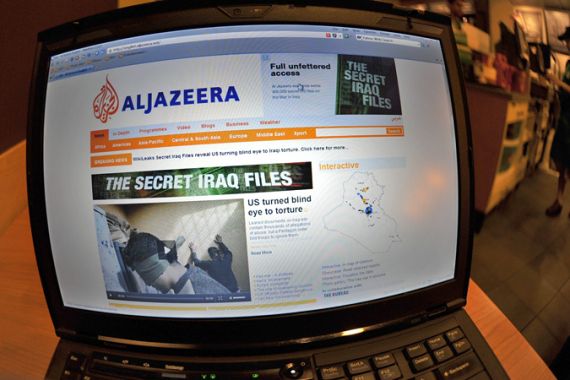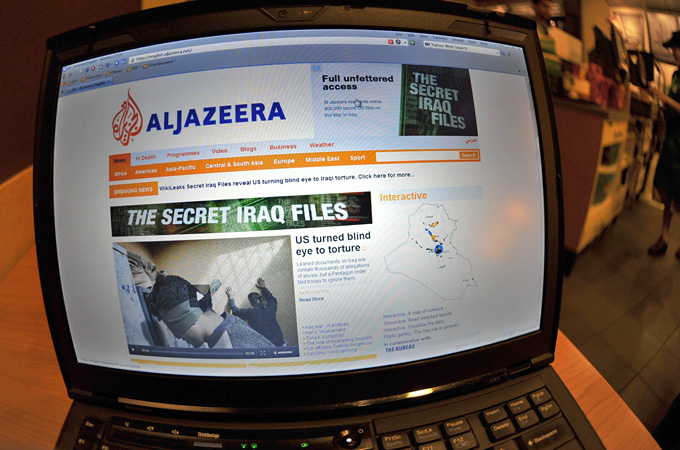US condemns Iraq war leaks
Officials say leak of Iraq war documents endangers the safety of US troops and Iraqi collaborators.

 |
| The documents released by WikiLeaks contains allegations that the US turned a blind eye to torture [AFP] |
US officials have condemned the leak of about 400,000 classified documents related to the Iraq war, saying it endangers American troops and possibly hundreds of Iraqi collaborators.
The documents, released to Al Jazeera and a number of other media outlets by WikiLeaks, contain details of civilian casualties and allegations that the US turned a blind eye to abuse committed by Iraqi forces.
While declining to discuss the specifics of the documents, Hillary Clinton, the secretary of state, said: “I do have a strong opinion that we should condemn in the most clear terms the disclosure of any classified information by individuals and or organisations which puts the lives of United States and partner servicemembers and civilians at risk.”
Geoff Morrell, the press secretary of the Pentagon, echoed her remarks, saying the details revealed “could potentially undermine our nation’s security”.
“The biggest potential damage here, we think, could be to our forces … because there are now potentially 400,000 documents in the public domain for our enemies to mine, look for vulnerabilities, patterns of behaviour, things they could exploit to wage attacks against us in the future.”
He said about 300 Iraqis mentioned in the documents are “particularly vulnerable to reprisal attacks” because of the documents’ release and that US forces in Iraq are trying to protect them.
Anders Fogh-Rasmussen, the Nato secretary-general, also warned that the release could endanger individuals’ safety.
“I can’t comment on the details of the exact impact on security, but in general I can tell you that such leaks … may have a very negative security impact for people involved,” he said.
Names blanked out
However, aware that releasing data such as names of individuals might raise concerns about their safety, Al Jazeera and its media partners have blanked out all the names of people who appear in the files before publishing.
Julian Assange, the founder of WikiLeaks, called Pentagon’s remarks “deceptive”.
“In fact, the Pentagon would not have been able to review our material in those few hours. It’s simply logistically impossible. And we also have strong confidence in our redaction process,” he told reporters.
“That statement by the Pentagon, presumably … is referring to their own internal review of their collection of significant actions for Iraq. It’s not referring to our material, but you noticed that they do not say that fact. Instead they try and issue some deceptive statement to fool the world press as they did last time with some similar statements into reporting something that is not true.”
The US made similar comments about the possible danger to US servicemen and those working with them after WikiLeaks released 70,000 documents about the Afghan war in July.
But so far, the Pentagon has not reported any incidents of reprisals against Afghans named in the leaked documents.
In an assessment outlined in a letter a month after the leak, Robert Gates, the defense secretary, said: “The initial assessment in no way discounts the risk to national security; however, the review to date has not revealed any sensitive intelligence sources and methods compromised by this disclosure.”
‘Taliban and al-Qaeda’
Speaking to Al Jazeera, Pentagon’s Morrell said no “senior” sources had been compromised after the release of the Afghanistan documents.
“There were no senior intelligence sources or methods compromised. That is a specific classification of a source, a very high level source,” he said.
“We know in the wake of the Afghan release, that our enemies, the Taliban, al-Qaeda and others, were mining that database, looking for vulnerabilities and how we respond in certain situations.
“Now they’ve got a universe of half-a-million documents to go through. That is seriously concerning for this department, for all our soldiers in the field.”
While the American government has been quick to respond to the thousands of secret Iraq war files released by WikiLeaks on Friday night, response from Iraq has been slower.
Iraq responds
Reporting from Baghdad, Al Jazeera’s Rawya Rageh said that first official reaction from the Iraqi government has been posted on the web site of Nouri al-Maliki, the prime minister, on Saturday.
Translating the statement, Rageh said the Iraqi government had pledged to take into consideration and investigate the “allegations” surrounding the conduct of the US military and contractors such as Blackwater. However, the statement also said that “the lenient rules of engagement of the US military have been a point of contention between the Iraqi government and the US military”.
The reports on the actions of non-American and political entities have to be “looked into carefully for the Iraqi government to determine whether they actually match the reality or whether they are merely propaganda for political purposes”.
The statement also exonerate al-Maliki – who questions the timing of the leaks – defending his conduct as “more than honourable”.
Meanwhile, Iraq’s rights ministry said the leaked document’s “did not contain any surprises”.
“The report did not contain any surprises, because we had already mentioned many things that happened, including at Abu Ghraib prison, and many cases involving US forces,” Kamil al-Amin, the ministry spokesman, said.
The files show that 109,000 people were killed in Iraq from January 1, 2004, to December 31, 2009. Of those, 66,081 – two-thirds of the total – were civilians.
“This figure of 109,000 victims is close to the one given by the Iraqi health ministry,” al-Amin said.
“There were many deaths and many people were buried without any documents, at a time when the [Iraqi] government still had not imposed its control over the situation.
“The ministry has proof of many deliberate killings.”